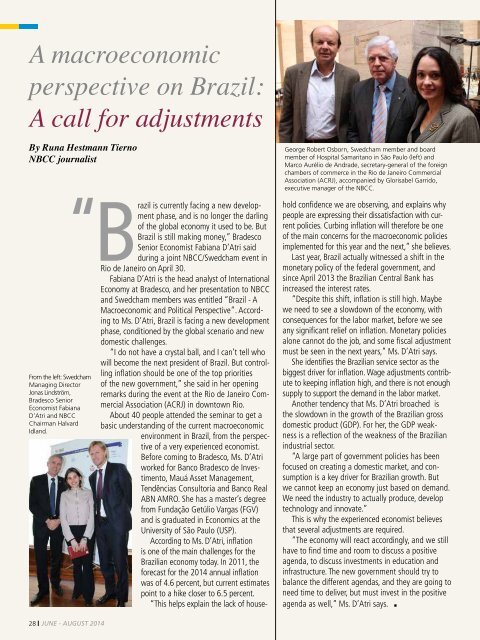Nordic-Light-Jun2014-Aug2014
Nordic-Light-Jun2014-Aug2014
Nordic-Light-Jun2014-Aug2014
You also want an ePaper? Increase the reach of your titles
YUMPU automatically turns print PDFs into web optimized ePapers that Google loves.
A macroeconomic<br />
perspective on Brazil:<br />
A call for adjustments<br />
By Runa Hestmann Tierno<br />
NBCC journalist<br />
From the left: Swedcham<br />
Managing Director<br />
Jonas Lindström,<br />
Bradesco Senior<br />
Economist Fabiana<br />
D’Atri and NBCC<br />
Chairman Halvard<br />
Idland.<br />
“<br />
Brazil is currently facing a new development<br />
phase, and is no longer the darling<br />
of the global economy it used to be. But<br />
Brazil is still making money,” Bradesco<br />
Senior Economist Fabiana D’Atri said<br />
during a joint NBCC/Swedcham event in<br />
Rio de Janeiro on April 30.<br />
Fabiana D’Atri is the head analyst of International<br />
Economy at Bradesco, and her presentation to NBCC<br />
and Swedcham members was entitled “Brazil - A<br />
Macroeconomic and Political Perspective”. According<br />
to Ms. D’Atri, Brazil is facing a new development<br />
phase, conditioned by the global scenario and new<br />
domestic challenges.<br />
“I do not have a crystal ball, and I can’t tell who<br />
will become the next president of Brazil. But controlling<br />
inflation should be one of the top priorities<br />
of the new government,” she said in her opening<br />
remarks during the event at the Rio de Janeiro Commercial<br />
Association (ACRJ) in downtown Rio.<br />
About 40 people attended the seminar to get a<br />
basic understanding of the current macroeconomic<br />
environment in Brazil, from the perspective<br />
of a very experienced economist.<br />
Before coming to Bradesco, Ms. D’Atri<br />
worked for Banco Bradesco de Investimento,<br />
Mauá Asset Management,<br />
Tendências Consultoria and Banco Real<br />
ABN AMRO. She has a master’s degree<br />
from Fundação Getúlio Vargas (FGV)<br />
and is graduated in Economics at the<br />
University of São Paulo (USP).<br />
According to Ms. D’Atri, inflation<br />
is one of the main challenges for the<br />
Brazilian economy today. In 2011, the<br />
forecast for the 2014 annual inflation<br />
was of 4.6 percent, but current estimates<br />
point to a hike closer to 6.5 percent.<br />
“This helps explain the lack of house-<br />
George Robert Osborn, Swedcham member and board<br />
member of Hospital Samaritano in São Paulo (left) and<br />
Marco Aurélio de Andrade, secretary-general of the foreign<br />
chambers of commerce in the Rio de Janeiro Commercial<br />
Association (ACRJ), accompanied by Glorisabel Garrido,<br />
executive manager of the NBCC.<br />
hold confidence we are observing, and explains why<br />
people are expressing their dissatisfaction with current<br />
policies. Curbing inflation will therefore be one<br />
of the main concerns for the macroeconomic policies<br />
implemented for this year and the next,” she believes.<br />
Last year, Brazil actually witnessed a shift in the<br />
monetary policy of the federal government, and<br />
since April 2013 the Brazilian Central Bank has<br />
increased the interest rates.<br />
“Despite this shift, inflation is still high. Maybe<br />
we need to see a slowdown of the economy, with<br />
consequences for the labor market, before we see<br />
any significant relief on inflation. Monetary policies<br />
alone cannot do the job, and some fiscal adjustment<br />
must be seen in the next years,” Ms. D’Atri says.<br />
She identifies the Brazilian service sector as the<br />
biggest driver for inflation. Wage adjustments contribute<br />
to keeping inflation high, and there is not enough<br />
supply to support the demand in the labor market.<br />
Another tendency that Ms. D’Atri broached is<br />
the slowdown in the growth of the Brazilian gross<br />
domestic product (GDP). For her, the GDP weakness<br />
is a reflection of the weakness of the Brazilian<br />
industrial sector.<br />
“A large part of government policies has been<br />
focused on creating a domestic market, and consumption<br />
is a key driver for Brazilian growth. But<br />
we cannot keep an economy just based on demand.<br />
We need the industry to actually produce, develop<br />
technology and innovate.”<br />
This is why the experienced economist believes<br />
that several adjustments are required.<br />
“The economy will react accordingly, and we still<br />
have to find time and room to discuss a positive<br />
agenda, to discuss investments in education and<br />
infrastructure. The new government should try to<br />
balance the different agendas, and they are going to<br />
need time to deliver, but must invest in the positive<br />
agenda as well,” Ms. D’Atri says.<br />
28 JUNE - AUGUST 2014


